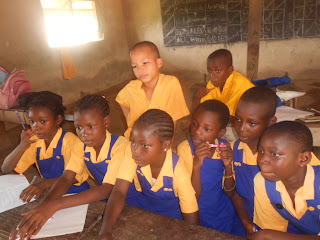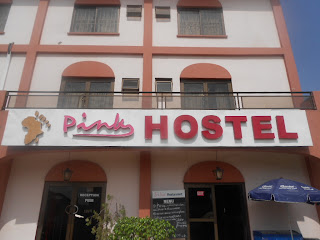Maranatha is an isolated, impoverished community on a
windswept strip of beach between the open ocean and the Volta River on the
south-eastern coast of Ghana.
The fishing community of around 700 people (with more than
half the population children) live in huts made of palm trees and the children
attend barren classes in dilapidated bamboo shelters with broken concrete
floors.
The beach village is one of the poorest corners of Ghana
with the greatest need for the basics of food, water, sanitation and buildings.
The villagers live mostly on Banku, a dough of corn maize. Rice, fish, goat
meat, eggs and the occasion apple are luxuries.
Typical of isolated communities, social problems are
entrenched and the most heartbreaking aspect of their plight is the deprivation
of education for the village children hungry for more physical activities and
mental stimulation.
Our dedicated crew leader Elisabeth is passionate about
improving the standard of living in Maranatha. Madventurer is currently
building concrete block classrooms to take the kids out of the unsafe
structures. And the project desperately needs an injection of funding and
skilled UK tradesmen to volunteer to help local workers complete the build. The
government is also supposedly committed to building new classrooms but are yet
to start.
Unbelievably the villagers use the beach for toileting. And
they wash in the river. This unhygienic situation is a daily health risk and also
pollutes the pristine environment. Madventurer is keen to build a block of pit
latrines to solve the problem. The village also needs water. I believe
rainwater tanks are an obvious solution, at least during rainy season.
Elisabeth enthuses about another project to empower the
women to make and sell crafts, to create income. Madventurer needs UK
businesswomen to volunteer to devise a business plan and steer the project to
sustainability. And micro financing, providing small loans to the women, would
get them up and running.
Dynamic young Ghanaian man, Winfred who grew up in poverty
in a similar island, is the driving force behind transforming the small
community. Single-handedly he has set up a beach camp for tourists, the Ada
Tourism Board, the Maranatha Women’s Association and established the school.
Now Madventurer has joined forced with Winfred and are committed to supporting
the community for the next few years.
On this overcast, sultry Wednesday we head off early to
catch the 7.30 am boat. In a flustered rush, I forget to take my glasses and my
anti-malaria tablet. I am already a dishevelled wreck before the day starts and
I notice as we hurry along the muddy main street how the locals are always
immaculately turned-out despite the relentless heat and rough conditions.
Elisabeth, Kara, Sam and James and me set off on the boat,
driven by a flashy young man called Desmond. Cruising through the calm
slate-green waters, the view of long wooden fishing boats and the tranquil
coastline is mesmerising, like a moving postcard.
Reaching the shore we stagger through the thick sand and
past the beach camp to where the children in smart brown and yellow uniforms
are lined up in rows and a tall, thin stern teacher is putting them through the
drill of their morning prayers, hymns and singing the National Anthem. They
march off to their classrooms and the desultory headmaster assigns us
volunteers a class each.
When I tentatively enter Grade Four, their usual teacher is
a no-show so I am in charge! How terrifying! These island kids have an
aggressive edge so once the novelty of a “blafono” (white person) has worn off
in about two minutes, they ignore me and argue loudly with each other in their
own languages, Ewe and Dangbe, so I’m bewildered and frantically attempting to
restore order.
The kids, aged from 11 to 16, don’t have pens or paper and
there’s no chalk! So I reach yet again for my one packet of colouring pencils
and trusty colouring books, bought for a pittance from the Tiger discount store
in Ealing, and proceed to tear out a page for each student and supervise the
sharing of the pencils.
The boisterous kids are suddenly quiet and engrossed and
unleash their creativity and unique styles; some flamboyant, some meticulous,
one girl likes the challenge of an intricate pattern and another serious little
chap uses the colours of the Ghanaian flag. They choose their own sticker and
proudly place it on their artwork.
I ask them to write essays on the back of their torn-out
pages and scrounge for biros, giving them my own pens from my handbag and
somehow they manage to write a few poignant lines about themselves and their
unusual lives in the beach community.
Then a fight erupts when one boy insults a girl and she
begins sobbing and yelling uncontrollably until a teacher comes in with his big
stick and threatens to hit the distraught girl. I put my arms around Augustina
and wipe her tears.
This humble little school desperately needs volunteer
trained teachers from the UK and other countries who can take English classes,
art and craft lessons and sports and support and inspire the local
teachers.
Seeing Maranatha, it is crystal clear that our opportunities
in life depend on where we are born and raised. And yet intervention from the
outside world can at least give these children an education they deserve and
broaden their future prospects.
Beautiful Ashia makes us volunteers very tasty fried rice
and I meet handsome Lenny, who runs the ‘drinks bar’. He is wearing a necklace
of beads with a Santa trinket and explains that Santa is kind and generous and
that’s how he wants to be! He adopts me instantly as his new mummy and asks me
to be his mentor giving guidance via his fancy mobile phone, once he tops up
the credit.
School finishes early and the teachers drift off so Sam and
James organise a kick of the football while Kara and I resort to colouring in
with the bored stragglers, who are yelling, “Madame, Madame” eager for praise
for their efforts. The miracle continues as the two Tiger colouring books are still
going strong as I tear out sheet after sheet, determined to get proper
resources for these deprived kids.
The boat zips us across the river and we return to the MAD
House, exhausted and dragging our feet, wilting in the high humidity. I’ve got
to clear my head so tackle my filthy washing and then visit the small store and
buy notebooks and 50 black, blue and red biros for the kids at the beach
school.
I cannot face writing about Maranatha straight away. The
experience of such deprivation is too disturbing. I feel overwhelmed. I am also
grumpy. I’m sick of the heat, sick of being dirty and sticky with insect
repellent, sick of craving crisp, green brocolli, sick of the mess.
I’m missing home and my family and wondering why I am buying
into these massive problems. But I counsel myself that I’m just tired and I’ll
be okay tomorrow after a night’s sleep. Everyone in the house is a little
demoralised today and after dinner of rice, chicken, eggs, spicy tomato paste
and plantain followed by mangoes, we all sit around reading quietly and
collapse into our bunks.
I have abandoned the suffocating mossie net, taking my
chances, relying solely on anti-malaria tablets and gooey insect repellent. So
I lie there on my rock hard bunk, in the dark, listening to the whirring of the
fan and the gentle rainfall, ruminating about those desperate kids.
If you are a plumber who could help with sanitation and water supply; a builder interested in volunteering
with the school building project; a trained teacher interested in volunteering
at the school; a business woman interested in supporting the women’s empowerment
or micro financing projects, a doctor or nurse interested in volunteering to do medical checks on children or a horticulture or permaculture expert who can
train the villagers how to grow veggies in sandy soil at the Maranatha beach village in Ghana,
please contact John Lawler at
madventurer
madventurer


































